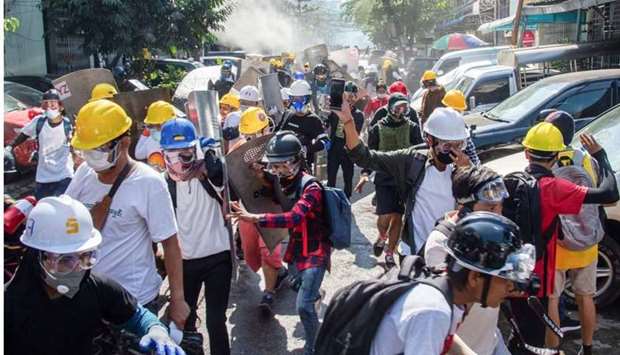* Three dead, several injured in two towns - witnesses
* Shops, factories, banks closed in Yangon
* Unions call for 'full, extended shutdown'
* Protesters wave sarongs to mark International Women's Day
* Over 50 people killed by security forces so far -UN
Three people were killed in Myanmar on Monday at demonstrations against last month's military coup, and hundreds of protesters in the main city Yangon pleaded for help after they were cornered by security forces after dark.
In a sign of the growing Western outrage at Myanmar's military, the European Union is preparing to target businesses linked to the army, according to diplomats and internal documents seen by Reuters.
The junta has come under increasing foreign criticism for its attempts to crush protests and re-establish control over the country, where more than 50 people have been killed since the Feb. 1 coup that ousted elected leader Aung San Suu Kyi.
Two protesters died of gunshot wounds to the head in the northern town of Myitkyina, witnesses said. They were hit by gunfire from buildings as police used teargas and stun grenades against protesters, but it was unclear who fired the shots.
"How inhumane to kill unarmed civilians," said a 20-year-old man who helped to move the bodies. "We must have our right to protest peacefully." Three people were wounded.
At least one person was killed and two wounded at a protest in the town of Phyar Pon in the Irrawaddy Delta, a political activist and local media said.
Military and police spokesmen did not respond to calls asking for comment on the latest incidents.
Daily protests for more than a month have demanded the release of Suu Kyi and what are now more than 1,400 other detainees. They also demand respect for the results of an election in November that her National League for Democracy (NLD) had won.
The army took power citing fraud in the ballot - an accusation rejected by the electoral commission. It has promised another election, but without giving a date.
So far, the military has brushed off condemnation of its actions and is digging in to weather the crisis, as it has in past periods of army rule.
On Monday, demonstrators gathered in Yangon, the second-biggest city Mandalay and several other towns.
After nightfall, police and soldiers cornered hundreds of protesters within several blocks in Yangon's Sanchaung neighbourhood, residents and protesters there said.
"Almost 200 young protesters are still blocked by the police and soldiers there. Local and international community needs to help them now! Please," one protest leader, Maung Saungkha, said on Twitter.
The British and US embassies urged security forces to let civilians leave the area without violence or arrests.
Earlier, protesters in some places had waved flags fashioned from htamain (women's sarongs) or hung them up on lines across the street to mark International Women's Day. Walking beneath women's sarongs is traditionally considered bad luck for men.
State television MRTV said such a display was severly insulting to religion and inappropriate in largely Buddhist Myanmar.
"The government's patience has run out and while trying to minimise casualties in stopping riots, most people seek complete stability are calling for more effective measures against riots," it said.
On Sunday night, soldiers took control of hospital and university compounds - firing shots and using stun grenades as they moved in.
Physicians for Human Rights (PHR) organisation denounced the occupation of the hospitals, which it said was a violation of international law and an attempt to block care for civilians.
"It is also a threat to attending medics to warn them against further treating injured protesters," the New York-based PHR said in a statement.
In a clampdown on independent media that has been covering the protests, state television announced the licenses of five outlets had been withdrawn.
At least nine unions covering sectors including construction, agriculture and manufacturing called on all Myanmar people to stop work to reverse the coup.
"The time to take action in defence of our democracy is now," they said in a statement.
Only a few small tea-shops were open in Yangon, witnesses said. Shopping centres and factories were closed.
The United States and some other Western countries have imposed limited sanctions on the junta and Australia on Sunday cut defence ties.
The European Union is preparing to widen its sanctions on the army to target businesses they run and the measures could be agreed by EU foreign ministers on March 22, according to diplomats and two internal documents seen by Reuters.
The United States and some other Western countries have imposed limited sanctions on the junta and Australia on Sunday cut defence ties.
In Sweden, H&M, the world's second-biggest fashion retailer, said it had paused placing orders with direct suppliers in Myanmar - saying it was shocked at the use of deadly forces against protesters, but also worried about instability.
Among those the military has detained is Suu Kyi's Australian former financial advisor. State television quoted junta leader General Min Aung Hlaing as saying the detention led to the discovery of secret financial information from the former government.
Reuters was unable to contact Sean Turnell for comment. The army has not announced charges against him.

